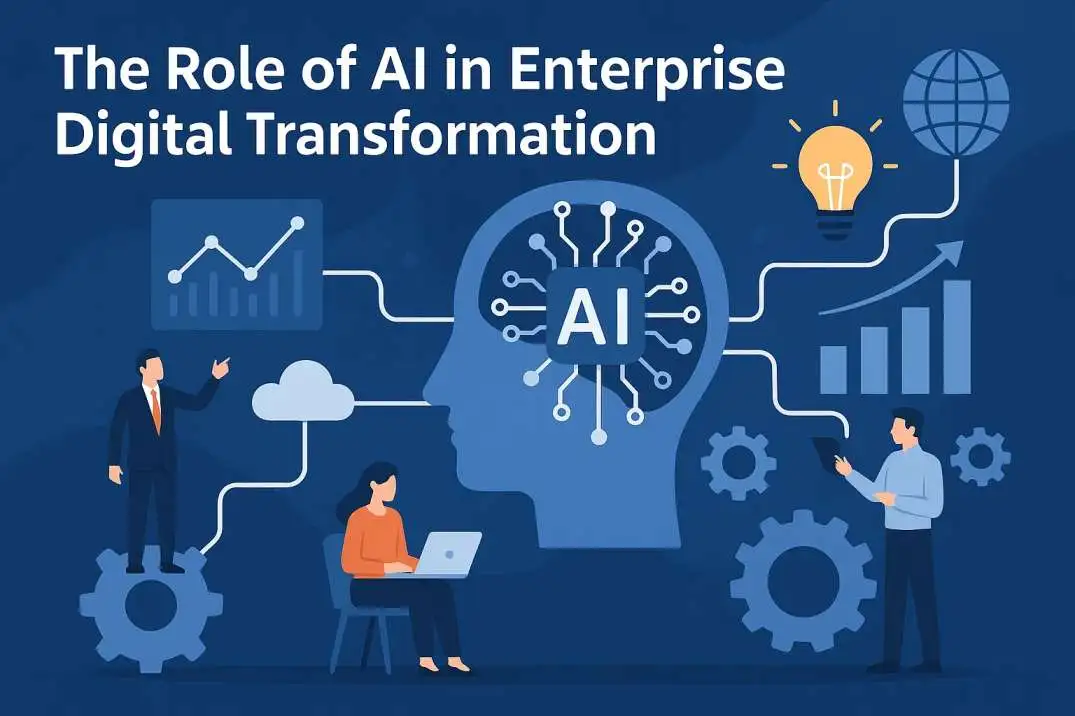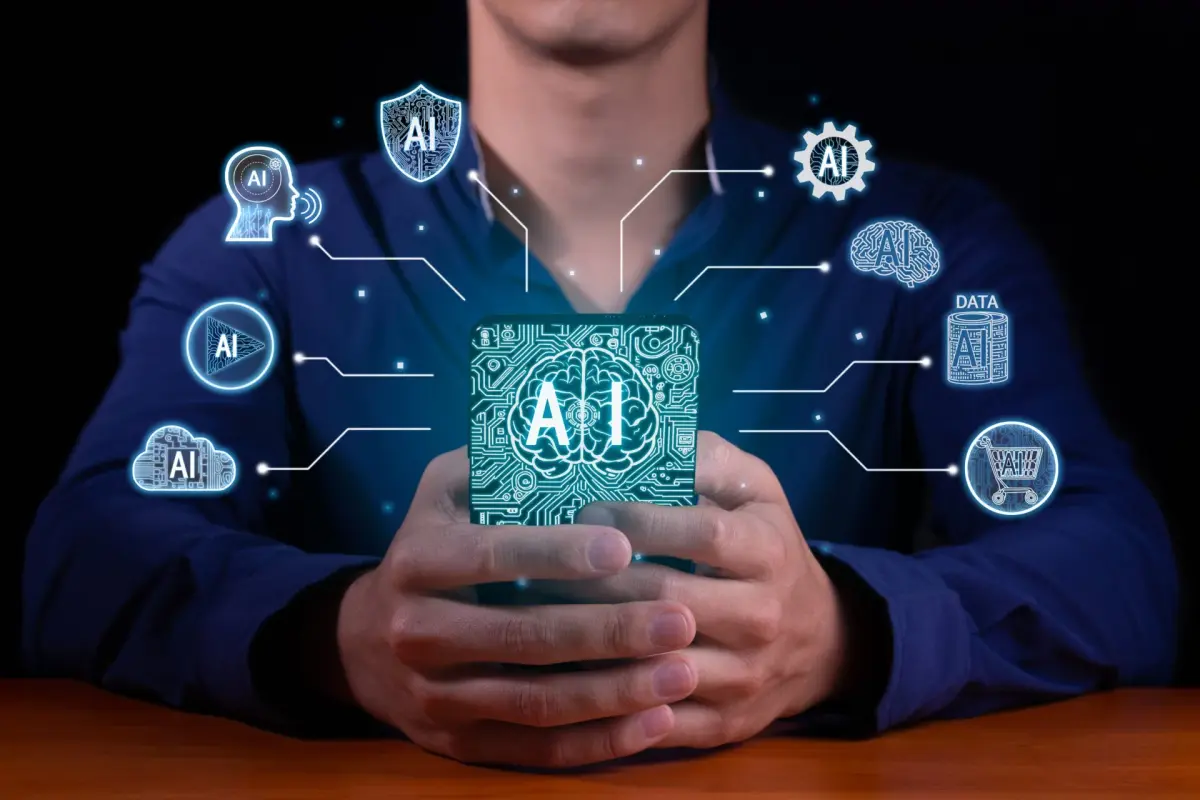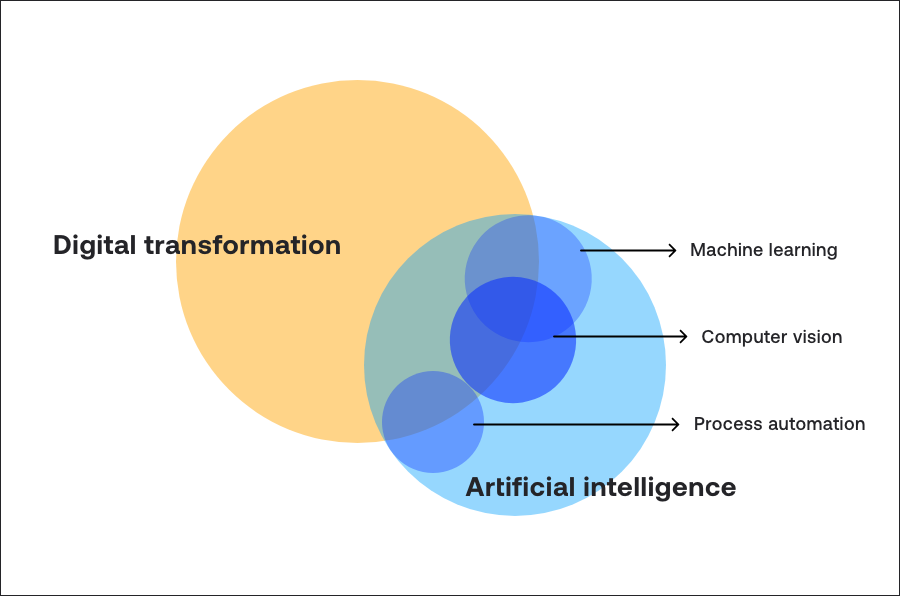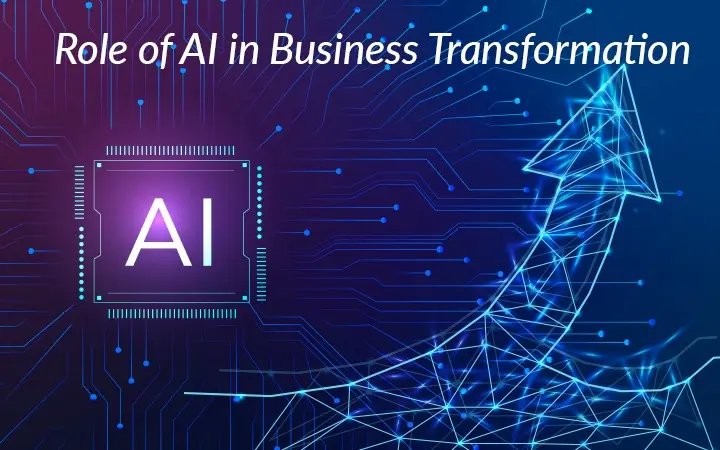
The Role of AI in Enterprise Digital Transformation
In these days’s rapid-paced enterprise global, virtual transformation is not elective—it’s vital. Enterprises across all industries are embracing advanced technology to live aggressive, meet client expectancies, and force operational performance. At the heart of this modification is Artificial Intelligence (AI), a technology this is reshaping how corporations function, innovate, and develop.
What Is Enterprise Digital Transformation?
Digital transformation in an employer context refers to the combination of digital technology into all regions of a business. This system basically changes how organizations operate and deliver fee to customers.

It also involves a cultural shift in which groups continuously mission the status quo, test with new ideas, and adapt to evolving market demands.
Key drivers for virtual transformation consist of:
- Increasing customer expectations
- Market opposition
- Need for operational performance
- Demand for facts-driven selection-making
- While many technology play a role in digital transformation, AI is one of the maximum effective enablers.
The Power of AI in Business Transformation
AI refers back to the simulation of human intelligence in machines which are programmed to assume, analyze, and remedy issues.
In enterprise digital transformation, AI is more than just automation—it is about making structures smarter, greater adaptive, and able to getting to know from facts. Here are some methods AI is gambling a transformative function in companies:
1. Enhancing Customer Experience
AI-powered tools like chatbots, virtual assistants, and customized advice engines are revolutionizing purchaser engagement. These gear use machine getting to know (ML) and natural language processing (NLP) to understand client wishes and offer real-time, customized assist.
Read Also: Why Are Property Rights Important to a Free Enterprise System?
For example:
- Chatbots reduce wait times through handling commonplace queries 24/7.
- AI engines propose merchandise based on user behavior, increasing conversions and income.
- Sentiment evaluation gear assist brands apprehend customer comments and improve services as a result.
2. Automating Business Processes
Robotic Process Automation (RPA) combined with AI is helping corporations automate repetitive, rule-based tasks. These tasks encompass statistics access, bill processing, compliance tests, and extra.
Benefits consist of:-
- Reduced human blunders
- Increased operational efficiency
- Cost financial savings
- Improved employee productiveness, as groups can focus on higher-cost paintings
3. Smarter Decision-Making
AI enables agencies to make higher and quicker selections by way of reading massive volumes of information and offering actionable insights. With predictive analytics, AI can forecast traits, perceive dangers, and uncover opportunities.
For instance:
- Retailers can expect inventory desires based on past sales and seasonal tendencies.
- Financial institutions can detect fraud in actual time.
- Manufacturers can optimize supply chains and limit downtime with predictive upkeep.
4. Empowering Data-Driven Culture

Data is the brand new oil, however it’s most effective precious whilst well refined and analyzed. AI gear assist corporations harness extensive amounts of dependent and unstructured records to advantage insights and drive innovation.
Related Article: Is Chevron Phillips Chemical Competitor with Enterprise Products?
With AI:
- Companies can identify patterns and anomalies that people may also miss.
- Leaders can make evidence-based decisions instead of relying on gut emotions.
- Data silos may be damaged down, permitting higher collaboration and strategic alignment.
5. Strengthening Cybersecurity
As agencies emerge as more virtual, the chance landscape expands. AI is crucial in detecting and responding to cyber threats quicker than traditional techniques.
- AI applications in cybersecurity consist of:
- Real-time risk detection
- Automated incident reaction
- Behavioral analysis to discover suspicious pastime
- Improved identification verification via biometric systems
6. Revolutionizing Human Resources
AI is also remodeling how corporations rent, educate, and manage skills. AI-powered recruitment structures can screen resumes, healthy applicants with process descriptions, and even behavior initial interviews the usage of NLP.
Moreover:
- AI enables in worker sentiment evaluation, improving retention.
- Personalized learning paths can be created the usage of AI-based totally getting to know management systems.
- HR analytics offer insights into group of workers developments and productivity.
Challenges in AI Adoption
Despite its potential, integrating AI into organisation operations isn't without demanding situations:
Data excellent and integration: AI structures depend on easy, steady information from more than one assets.
Skills gap: There's a scarcity of specialists professional in AI and records technology.
Change control: Adopting AI regularly requires changes in workflows, that could face resistance.
Ethical concerns: Bias in algorithms and worries around privateness have to be addressed responsibly.
To triumph over those, establishments need a clear AI strategy aligned with their digital dreams, robust records governance, and a dedication to non-stop learning and innovation.
The Role of AI in Enterprise Digital Transformation
Digital transformation refers to the combination of virtual technologies into all regions of a business, fundamentally converting how it operates and delivers cost to customers. To know more guide on What Can I Do With an Entrepreneurship Degree?
AI has increased this process by means of enabling agencies to research extensive amounts of facts, automate complicated tasks, and personalize purchaser stories. According to a 2023 report from McKinsey, organizations that leverage AI efficaciously are 1.Five instances much more likely to acquire their digital transformation goals.

One of AI’s maximum widespread contributions is in statistics analytics. With gear like system mastering algorithms and natural language processing (NLP), companies can extract actionable insights from established and unstructured facts.
This capability permits for more knowledgeable selection-making, quicker hassle-solving, and the anticipation of market trends. As an instance, retail large Amazon uses AI to analyze customer conduct and optimize its deliver chain, enabling identical-day shipping and personalised product hints.
Looking Ahead: The Future of AI in Enterprises
The future of organization virtual transformation is deeply intertwined with the development of AI. As AI technology emerge as more available, less expensive, and included, we are able to expect:
- Greater personalization in patron interactions
- Autonomous operations in manufacturing and logistics
- Voice- and gesture-based interfaces in place of business gear
- More accurate and transparent choice-making models
- Increased collaboration among people and AI-pushed machines
- Organizations that include AI not simply as a device, however as a strategic associate, will lead the subsequent wave of innovation and growth.
Conclusion
AI is no longer only a buzzword—it’s a key motive force of digital transformation inside the corporation panorama. From automating responsibilities and improving customer service to powering insights and strengthening cybersecurity, AI is supporting agencies perform smarter and faster.
However, fulfillment in AI adoption depends on a nicely-described strategy, a focal point on ethical practices, and an adaptable team of workers. Enterprises that invest in AI nowadays are putting the level for a greater agile, sensible, and future-prepared commercial enterprise the next day.

